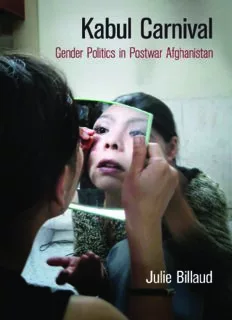
Kabul Carnival: Gender Politics in Postwar Afghanistan PDF
Preview Kabul Carnival: Gender Politics in Postwar Afghanistan
Kabul Carnival THE ETHNOGRAPHY OF POL ITI CAL VIOLENCE Tobias Kelly, Series Editor A complete list of books in the series is available from the publisher. KABUL CARNIVAL Gender Politics in Postwar Af ghan i stan Julie Billaud UNIVERSITY OF PENNSYLVANIA PRESS PHILADELPHIA Copyright © 2015 University of Pennsylvania Press All rights reserved. Except for brief quotations used for purposes of review or scholarly citation, none of this book may be reproduced in any form by any means without written permission from the publisher. Published by University of Pennsylvania Press Philadelphia, Pennsylvania 19104- 4112 www .upenn .edu /pennpress Printed in the United States of America on acid- free paper 1 3 5 7 9 10 8 6 4 2 Library of Congress Cataloging- in- Publication Data Billaud, Julie, author. Kabul carnival : gender politics in postwar Afghanistan / Julie Billaud. pages cm — (The ethnography of political violence) Includes bibliographical references and index. ISBN 978-0-8122-4696-4 (alk. paper) 1. Women—Afghanistan—Social conditions—History—21st century. 2. Nationalism and feminism—Religious aspects—Islam—History—21st century. 3. Postwar reconstruction— Afghanistan. 4. Public spaces—Afghanistan—History—21st century. 5. Violence against women—Afghanistan—History—21st century. I. Title. II. Series: Ethnography of political violence. HQ1735.6.B55 2015 305.409581—dc23 2014040354 Carnival is not a spectacle seen by the people; they live in it, and everyone participates because its very idea embraces all the people. While carnival lasts, there is no other life outside it. During carnival time life is subject only to its laws, that is, the laws of its own freedom. It has a universal spirit; it is a special condition of the entire world, of the world’s revival and renewal, in which all take part. Such is the essence of carnival, vividly felt by all its participants. —Mikhail Bakhtin, Rabelais and His World PB Dorothy L CONTENTS Prologue: “If Only You Were Born a Boy” 1 Introduction: Carnival of (Post)War 5 PART I. PHANTOM STATE BUILDING Chapter 1. Queen Soraya’s Portrait 31 Chapter 2. National Women’s Machinery: Coaching Lives . Hodgson in the Ministry of Women’s Aff airs 62 Chapter 3. Public and Private Faces of Gender (In)Justice 85 PART II. BODIES OF RE SIS TANCE Chapter 4. Moral Panics, Indian Soaps, and Cosmetics: Writing the Nation on Women’s Bodies 111 Chapter 5. Strategic Decoration: Dissimulation, Per for mance, and Agency in an Islamic Public Space 147 Chapter 6. Poetic Jihad: Narratives of Martyrdom, Suicide, and Suff ering Among Afghan Women 177 Conclusion: Th e Carnival Continues 203 viii Contents Chronology 211 Notes 219 Bibliography 227 Index 241 Ac know ledg ments 245 P B SSeecctt PROLOGUE “If Only You Were Born a Boy” “As I grew up, my mother constantly repeated to me: ‘if only you were born a boy.’ So I eventually became one.” Th is is the pragmatic way in which eighteen- year- old Zahra explains how she became Zia. Zahra rents a small room in a family house located next to Kabul Polytechnic University. When, a couple of years ago, her parents divorced and remarried, none of them wanted her around anymore. Mistreated by her stepfather, neglected by her mother, and with no relatives to take care of her, she set out to take her future into her own hands and not to rely on anyone. Because of the fact that as a girl she could not enjoy this level of autonomy, she cut her hair short, purchased boys’ clothes, changed her gender identity, and found herself a job in a small cultural or ga ni za tion. With her big hazel eyes, her confi dent appearance, and her direct way of staring at people, Zahra— who becomes Zia as soon as she steps outside the house— easily passes herself off as a handsome young man. I met Zahra through my friend Fawzia who boards at the National Wom- en’s Dormitory. Fawzia befriended Zahra at the self- defense class they both attend once a week at Bagh- e Zanana, the women’s park. Th e walls of Zahra’s bedroom are covered with posters of Jackie Chan and Bollywood movie stars. As she casually lights up a cigarette, tipping her head back to blow away large clouds of blue smoke, she comments: “Now, I can do what ever I want. I can ride a bike, do the shopping, go to work. I can even be mahram [an un- marriageable kinsman; a woman must be accompanied by such an escort out- side her house] for my girlfriends! I will never go back!” “You see, Julie, she is a bacha posh [girl dressed like a boy]! She even thinks like a boy! Deep inside, she is a boy and a beautiful one!” says Fawzia, and then she leans forward to whisper in my ear: “I love Zahra! Zahra is my boy- friend!” and she bursts into laughter.
Description: